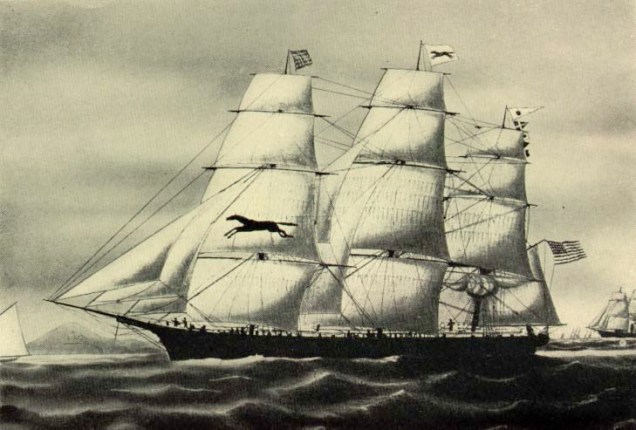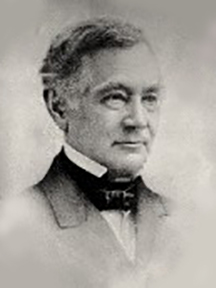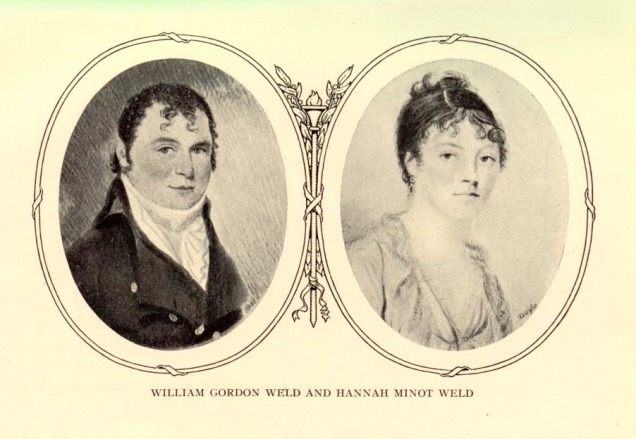The name Weld, probably derived from the word “wild,” first appeared in its current form with William Weld, the High Sheriff of London, in the year 1352. It is difficult, however, to trace cleanly the various family lines, as they move in and out of obscurity, and William may or may not have been an ancestor of ours.
The first definite point of contact we have is with a Weld, Christian name or first name unknown, born before 1500, who in turn was the father of John Weld “The Elder.” From him, we can move to Thomas and Joseph Weld, the founders of the Weld family in America.
The book Weld Collections by Charles Frederick Robinson is the definitive source on this family, both in depth and breadth of information. For sheer succinctness and readability, however, Isabel Anderson easily wins out. The following is a brief excerpt from her description of why these two men came to America, and how they initially faired.
_________________
from Under the Black Horse Flag, by Isabel Anderson..
…Apparently, however, a branch of this family were Puritans, one of whom, the Reverend Thomas Weld, had been educated at Trinity College, Cambridge, and settled as Vicar of Terling, Withem, Essex, where four sons were born to him. In the latter part of 1629, Laud, afterwards Archbishop, the great enemy of the Puritans, began his persecution. Thomas Weld was excommunicated and charged to depart, evidently to his deep indignation, for his friend, the Reverend Thomas Sheppard, writes: ‘Mr. Weld and other ministers consulted together whether it were best to let such a swine root up God’s plants in Essex.’
But the wisest thing for the Reverend Thomas Weld to do under the circumstances was to get into Scotland and from there escape to New England, ‘it being impossible to leave direct without being arrested, if discovered.’ The two clergymen, Sheppard and Weld, had already resolved upon this course, when, being in the neighborhood of the church where Laud was preaching, they drew near, probably out of curiosity, to listen. Laud, coming out of the church suddenly, found Thomas Weld standing upon churchly territory, a thing which he had no right to do because he had been excommunicated. The Archbishop challenged the Puritan and, in an interchange of angry words, accused him of intending to go to New England, and Weld instantly admitted it. ‘Hereupon he was committed to the Puirsuivant and bound over to answer it at the High Commission on a bond of 100 marks.’
He managed to escape, probably by forfeiting his bond, and with him sailed not only his brother, Captain Joseph Weld, but Joseph’s wife, one son and three daughters, and John Winthrop, later Governor of the Plymouth Colony. Suffolk, England, was the early home of all of them (the earliest date to which the ancestry of the American line can be traced with certainty is that of John Weld of Long Melford County, Suffolk who died in 1551) and no doubt the long friendship of Governor Winthrop and Thomas Weld had begun in their English youth.
There were some sixty‑five men who sailed on the ship William and Frances from London, March 9, 1632, although the clearance list at the Custom House only gives the names of about twenty. Ministers and men of position and prominence were not allowed to leave England, and could only make their way out of the country secretly. They landed in Boston early in June, and within a month Thomas Weld was installed as the first pastor at the First Church in Roxbury. Later he became one of the first Board of Overseers of Harvard College.
__________________________
Captain Joseph Weld, the Reverend Thomas Weld’s brother, and the real founder of the American family of Weld, had arrived on the same ship, as the reader well remember, bringing his wife, one of his sons, and his three daughters. Another son followed him six years later. Being well trained in military affairs, Captain Joseph Weld was a valuable aid to Governor Winthrop and served in numerous fights with the Indians, as well as being one of the Commissioners to make a treaty of peace with the Pequots.
In company with other prominent men in the Colony, he was given a grant of three thousand acres at Braintree for the ‘encouragement of Iron Works to be set up there.’ For his personal estate the Colony gave him several hundred acres in Roxbury. All the district, from what is now Dudley Street to the outlying sections of West Roxbury, was then included in the one name Roxbury
His son John settled on this Roxbury grant, while his father remained at his earlier dwelling on Roxbury Street in what is now Jamaica Plain. He made many journeys to England on business and prospered. He was one of the first donors to Harvard College, and Savage states that at the time of his death he was the richest man in the Colony. Not only John Weld fought against the Pequot Indians in 1676 in King Philip’s War but both his sons and his grandsons also were officers in the service of the Colony. Governor Winthrop mentioned his death as a great loss to the settlement. The Apostle Eliot, his particular friend, says in his journal that the Captain died of cancer of the throat and jaws. Before leaving on his last journey to England, while in the town of Ipswich, Joseph Weld made his will; though contrary to his own expectations, he did live to get back to America.
The will begins as follows: ‘Being visited by the hand of the Lord, and not knowing what the purposes of God may be; my spirit being restless and out of quiet because my house is not set in order . . . I do therefore make this my last will and testament.’ After giving directions for a sum to ‘the college at Cambridge’ and allotting the house, the barns, the arable lands, and the marshes among his children, he proceeds to smaller details. Each of the children by his first wife was to have a pair of sheets; each might choose a book from his library; his son John was to have his best stuff suit and his cloth cloak, Thomas his frieze suit. But his friend, John Eliot, was willed the pride of his wardrobe, his black tamey cloak. His second wife was to get the down bed and bolster, and all the things belonging to the best chamber, including ‘the yellow rugg and the largest green rug”.’ The will ends with many codicils showing how carefully the good man desired to do full justice to all his children and to show appreciation to the executors, whom he remembered at the last with ten pounds each, a very good sum in those days…


